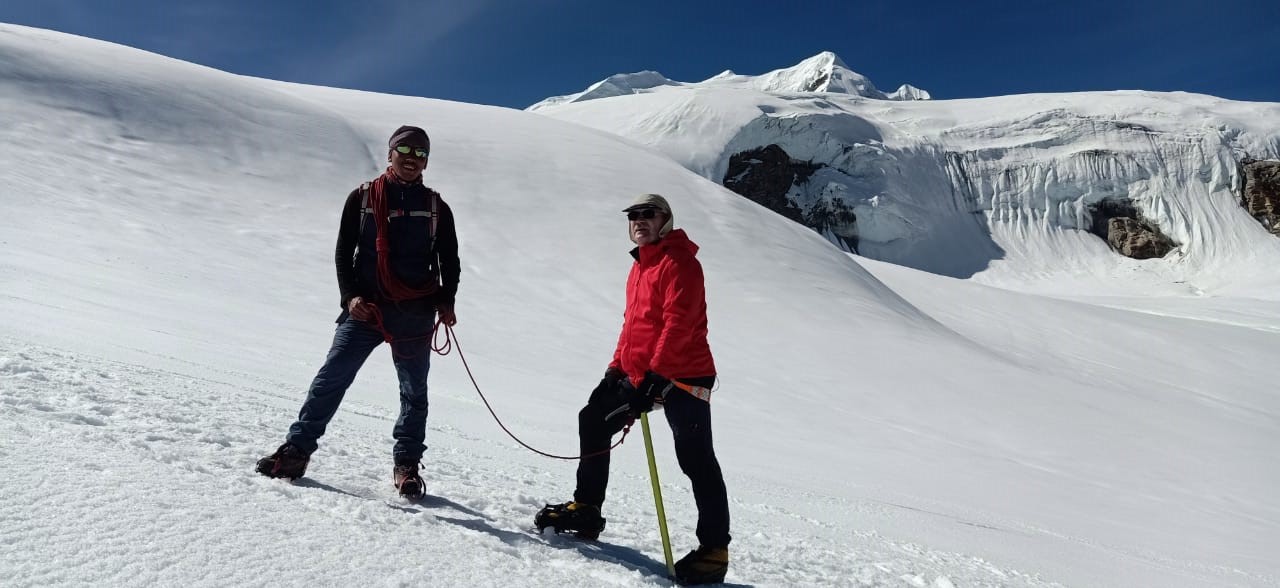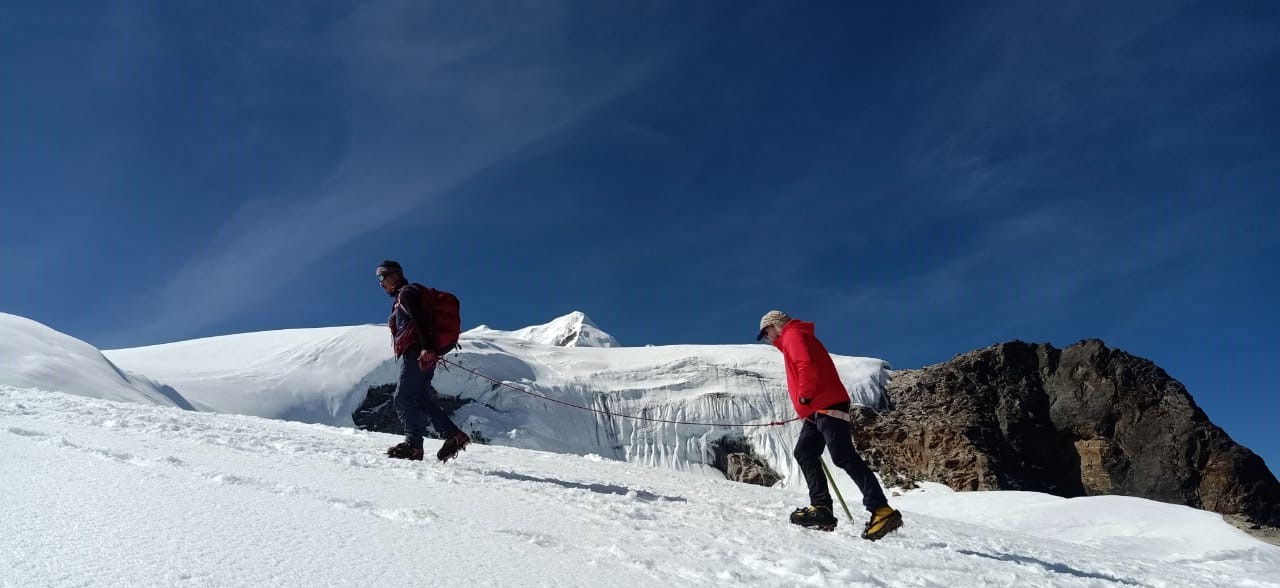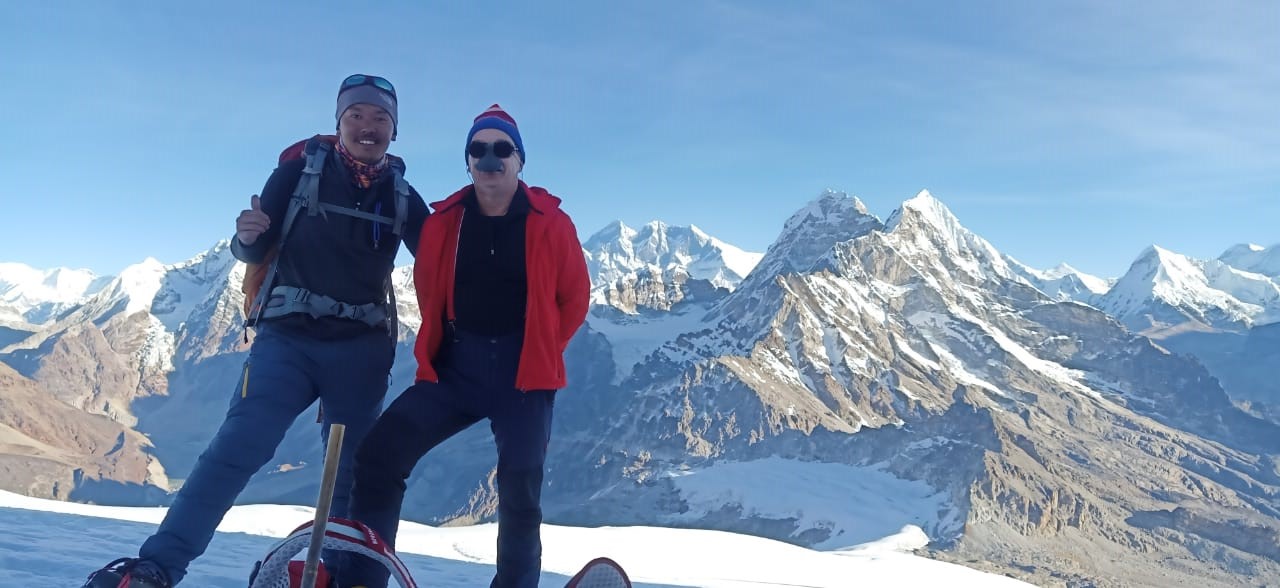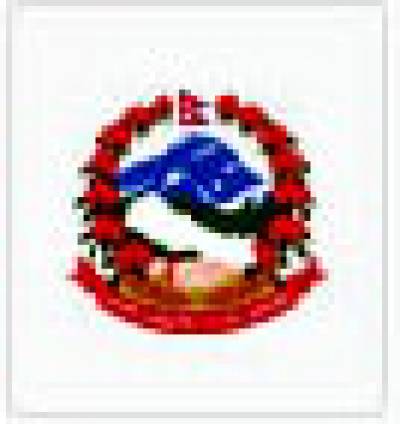Mera Peak Climbing 20 Days
This is a chance to go climbing without the necessary permits that most climbing expeditions require in Nepal. Mera Peak fits the bill perfectly and at (6,476m/21,190ft) you will have spectacular views of several 8000m plus peaks, such as Mt. Everest, Cho Oyu, Kanchenjunga, Lhotse, and Makalu. Also on this trek, you will get a good understanding of how the Sherpa villagers’ in this mountainous region live. This climbing expedition has numerous stops at teahouses, overnight camping plus a real climbing adventure within the Sagarmatha (Everest) National Park.
Your journey begins with a short scenic flight to Lukla and trekking through a number of Sherpa villages, conspicuous by their Gompas (monasteries), chortens (engraved stones) and multi-colored Tibetan prayer flags. We will venture along isolated and less trekked trails through the Hinku and Hunku valleys and then head up to Mera Peak Base Camp, summit the peak and return with an adrenalin-pumped experience. Climbing Mera Peak is not considered a technical climb with slopes not exceeding 30 degrees. You will feel safe and secure as fixed ropes will guide you to the summit following in your guide’s footsteps.
Accommodation is in teahouses during the trek right up until we get to Khare where we spend two nights in tented camps with the climbing crew (porters, cook, guide, and group leader). At Khare we will spend time acclimatizing, that is considered essential if climbing to higher altitudes such as Mera Peak. On the second day of the trek we will cross Zatra La Pass which is the most popular route to Mera Peak.
We will then head to Lukla and board a scenic flight back to Kathmandu. This is a great combination of trekking and climbing that takes you to the summit of a sizeable peak – without the bother of obtaining climbing permits. Mera Peak climbing is an ideal choice for anyone with moderate mountaineering experience. The most challenging aspect of this trek is getting acclimatized and then having to cope with reduced oxygen as you head to the summit. You will need only basic climbing skills, which our guide will assist you with before your ascent to the summit.
Usually, this Mera peak climbing tour involves climbing the Central Mera Peak (6461m). There are two other faces of Mera Peak – North Mera (6476m) and South Mera (6064m). We can also operate climbing trips for these faces as well. Please do not hesitate to click the 'Make an Enquiry' if you have any questions.
Sherpa Expedition & Trekking was established in 1977 and now with more than 40 years in the business we know how to care for our clients and will look after trekking permits to Sagamartha National Park, meals and accommodation on this climbing expedition.
ITINERARY
Day 1 : Arrival in Kathmandu (1,300m/4,264ft) & transfer to hotel.
A representative from Sherpa Expedition and Trekking will meet you at Tribhuvan International Airport. You will then be taken to your hotel in Thamel, the tourist hub of Kathmandu. In the evening we will have a welcome dinner where you will also be briefed on what to expect on your journey to Mera Peak. This is a good opportunity to meet your fellow trekkers and your guide.
Day 2 : Kathmandu: trip preparation.
We rest for most of the day and unpack and ready ourselves for the trek. We will also visit Sherpa Expedition and Trekking’s office in the afternoon where our trekking guides will check our set of climbing equipment to make sure that they are in good condition before heading off on the trail.
Day 3 : Fly to Lukla & trek to Paiya (Chutok) (2,730m/8,956ft) Duration: 5-6 hours.
We take an early morning flight to Lukla and from Lukla begin our trek to Paiya along a jungle trail, cross a bridge over the Handi Khola (river) and then arrive at Surkhe Village. We continue heading south and cross the Chutok La Pass before reaching the small settlement of Paiyan, also known as Chutok.
Day 4 : Paiya to Pangom (2,846m/9,337ft) Duration: 5-6 hours.
Leaving Paiya, we cross a wooden bridge and trek through Kari La Pass where there are beautiful rhododendron and bamboo forests along the way. The amazing views of mountains and the view of Dudh Koshi River will leave you awestruck.
Day 5 : Pangom to Ningsow (2,863m/9,393ft) Duration: 4-5 hours.
This morning we leave Pangom and head to Pingkongma La Pass and then ascend on a trail to the north. Along the way, we cross Peseng Kharka Khola (river) and pass Kharka Danda. We cross the Ningsow Khola (river) before coming to Ningsow Village where we will stay overnight.
Day 6 : Ningsow to Chhatra Khola (2,800m/9,186ft) Duration: 7-8 hours.
From Ningsow we ascend to Ramailo Danda from where we have our first views of Mera Peak. We then follow the trail heading through the Makalu Barun Park. We will follow the Pasang Lhamu trail until we reach our overnight objective of Chhatra Khola.
Day 7 : Chhatra Khola to Kothe (3,691m/12,109ft) Duration: 6-7 hours.
This morning we head north on the trail to Mera Peak and arrive at the Majang Khola (river) where the trail joins another that leads to Hinku Khola. We continue to Tashing Ongma and then cross the bridge over the Sanu Khola before arriving at Kothe where we will stay overnight.
Day 8 : Kothe to Thaknak (4,358m/14,297ft) Duration: 3-4 hours.
Today we follow the trail along the banks of the Hinku Khola with Mera Peak directly above us. We will stop for a lunch break at Gondishung, a small settlement for cattle and yak grazing herders. On the trail we pass the 200-year-old Lungsumgba Gompa (monastery) before arriving at Thangnak where we will stay the night.
Day 9 : Thaknak to Khare (5,045m/16,486ft) Duration: 2-3 hours.
This morning we leave Thagnak and head to Khare and along the trail have views of Charpate Himal. The trail ascends across moraines to the base of the Hinku Nup (valley glacier) and Shar glaciers. After arriving at Khare we can view the north face of Mera Peak. We will stay here the night.
Day 10 : Khare: Acclimatization and pre–climb training.
Today we have a day set dedicated to acclimatize; something that cannot be ignored. Health professionals strongly recommend staying active during this time. Your guide will also go over some tips on climbing Mera Peak and the use of an ice axe, harness, ascenders and crampons. We will stay overnight at Khare.
Day 11 : Khare to Mera High Camp (5,780m/18,958ft) Duration: 6-7 hours.
We have to cross a rocky terrain to reach Mera Peak Base Camp and will then continue through Mera La Pass to reach Mera High Camp. Once at High Camp we will have some awesome views of Mt. Everest, Makalu, and Cho Oyu, Nuptse, Chamlang, and Baruntse. We will stay here overnight.
Day 12 : Summit Mera Peak (6,461m/21,190ft), trek to Kongma Dingma (4,850m/15912ft) Duration:10-11 hours.
Today is going to be a long and tiring one as we head to the summit. We will have some amazing views of Mt. Everest, Makalu, and Cho Oyu, Nuptse, Chamlang, and Baruntse. The views from the summit go on forever! After some time at the summit we retrace our foot-steps back to high camp where we rest for a while before descending to Kongma Dingma for the night.
Day 13 : Kongma Dingma: rest day.
Today is a well-deserved rest day after yesterday’s mammoth effort to reach the summit.
Day 14 : Kongma Dingma to Seto Pokhari (5035m/16519 ft) Duration: 5-6 hours.
This morning we head up a remote valley to the yak pastures further up. As we trek we have Chamlang on our left, and Baruntse in the distance. We continue up the valley in the direction of Mt. Everest and Lhotse. We will camp overnight at Seto Pokhari.
Day 15 : Seto Pokhari to Amphu Labcha Base Camp (South) (5,650m/18,536 ft) Duration: 5-6 hours
This is one of the most remote regions of the Himalayas, so it is rare that we see any trekkers on the trail unless it is in the peak tourist season. From Seto Pokhari we pass several lakes in the upper Hunku Basin. After passing Hunku Pokhari we come to Hunku Glacier. Tonight we will stay at Labtsa Base Camp.
Day 16 : Amphu Labcha Base Camp to Chhukung (4,750m/15,580 ft) Duration: 9-10 hours.
Today we cross the Amphu Labtsa La Pass (5,845m) then cross the Amphu Labtsa Glacier. Lhotse Shar Glacier and Imja Glacier are very close. The trail then heads around Imja Tsho Lake and then follows the main Island Peak trail. As we continue we come close to Ama Dablam Glacier before arriving at Chhukung where we stay overnight.
Day 17 : Chhukung to Namche Bazaar (3,438m/11,280 ft) Duration: 5-6 hours.
Leaving Chhukung we return on the same path to Imja Khola heading up through the forest to Tengboche. If there is enough interest we can visit the nuns at their Tengboche residence. After lunch at Tengboche we descend along a path surrounded by alpine bush and juniper trees. After crossing the bridge over the Dudh Koshi watercourse, our path takes us to Dudh Koshi Gorge taking us through pine forests before finally reaching Sansa. On the way down we should keep our eyes peeled for glimpses of mountain goats, snow leopards, colorful pheasants, and other wildlife. After emerging from the forest we pass through Chorten before reaching the military camp at Namche Bazaar. Tonight we stay at Namche Bazaar.
Day 18 : Namche Bazaar to Lukla (2,800m/9,184ft) Duration: 6-7 hours.
This morning we head out on a mostly a downhill trek on a trail next to the Dudh Koshi River. We cross several suspension bridges, pass by a number of monasteries and villages before arriving at Lukla. We can spend the rest of the day resting or wander around Lukla and the nearby countryside. This is our last day of the trek.
Day 19 : Fly back to Kathmandu from Lukla.
This morning we take a scenic flight to Kathmandu giving us an opportunity to look down on the mountains we trekked around on our journey to Mera Peak. After arriving back at Kathmandu we can choose to rest at our hotel in Thamel or go for a wander around the area and do some souvenir shopping before our departure tomorrow. This evening there will be a farewell dinner to celebrate the successful accomplishment of our Mera Peak climb and Amphu Labtsa Pass adventure.
Day 20 : Final departure.
Today a representative from Sherpa Expedition and Trekking will take you to the airport at least three hours prior to your departure. On your journey home you may already be planning another mountain climbing adventure – even a 7000 or 8000-meter peak!
SERVICES
Costs included in your package.
- Airport picks up and transports by private Car/Jeep.
- Three night’s standard twin sharing Hotel in Kathmandu with breakfast.
- Three meals a day (Breakfast, lunch, and dinner) during the trek.
- Fresh fruit every evening after dinner.
- Trekking Lodge (Tea House) during the trek and tent camp accommodation during climbing session.
- All necessary paperwork including Makalu Barun National Park Pemit Entry fees.
- Kathmandu-Lukla-Kathmandu (Ramechhap -Lukla- Ramechhap) flight with private airport transfer and domestic airport tax.
- A highly experienced, helpful, knowledgeable, friendly, English speaking well trained, Government license holder guide with all his salary, food, drinks, accommodation, transport and insurance.
- Climbing permit of Mera Peak.
- Strong, helpful Sherpa porters with proper safety equipment and walking equipment, his salary, food, accommodation, and insurance (one porter for two people).
- Comprehensive medical supplies (first aid kit will be available).
- Arrangement of emergency helicopter service (paid by your Travel Insurance Company).
- Use of sleeping bag, down jacket, duffel bag and walking poles (if you don’t have your own, to be returned after trip completed).
- Sherpa Expedition and Trekking T-shirt
- Government taxes and official expenses.
- Trip achievement certificate after successful trip completion.
- Oxygen meter to check your pulse and oxygen saturation and heart rate twice daily (Very useful to check Altitude Mountain Sickness(AMS) symptoms) which will ensure your health during the trek.
- Assistant guide for groups of 8 or more people.
Costs Exclude
- Meals whilst you are in Kathmandu - lunch, and dinner.
- Nepal entry visa fee (easy to obtain the visa on arrival at Tribhuvan International Airport – Kathmandu). $30 USD for 15-day, $50 USD for 30 Days, and $125 USD for 90 Days visa.
- Personal travel and medical insurance.
- International airfare.
- Your personal expenses.
- All the alcoholic and nonalcoholic, soup, tea, coffee, hot chocolate, cocoa, mineral water, extra food, cold and hot drinks on trek ( i.e. those you choose to purchase along the way and during evenings in the tea houses)
- All desserts & sweet things like chocolate, cake, pie, pudding.
- Hot shower and battery charging at the tea houses.
- Tips for the guide, porter, and driver (tipping is expected)
- Excess baggage of more than 10 kg for Lukla flight.
- NOTE: If you return earlier from the trek due to sickness or any problem, the money you paid for the flight, hotel, mountain room, food, etc. is nonrefundable, and you will need to bear the expenses for the hotel, food, etc. in Kathmandu yourself.
EQUIPMENTS
You will be carrying all of your gear and share some of the cluster gear. Keeping your pack light is important, so choose light-weight clothing and equipment. Be sure to have a range of clothing suitable for all conditions. Sudden change of weather may require layering of clothing. Three layers will meet your needs. Avoid cotton or fabrics that do not maintain heat when cold. Comfortable durable wool (or proven fabrics) that breathe and expel sweat lends itself to an additional pleasant experience!'
We will offer complimentary water and a windproof duffle that you'll use on the trek - carried by porters. The duffle is yours to keep once at the end of the trek. You can safely leave your bag, together with your non-trekking requirements, at our office in Katmandu and collect them upon your return.
All equipment, such as base camp tents, room accessories, climbing rope, ice screws, snow bar and ice hammer is provided by Sherpa Expedition & Trekking.
Upper Body:
- Base Layers: Moisture-wicking and quick-drying shirts and thermal tops.
- Insulation Layers: Fleece or down jackets to provide warmth.
- Waterproof Shell Jacket: A durable and breathable jacket to protect against wind and rain.
- Softshell Jacket: A lightweight and water-resistant jacket for added protection.
- Climbing Harness: A comfortable harness to secure yourself to the rope.
- Helmet: A strong and well-fitting helmet to protect your head from falling objects.
- Gloves: A combination of lightweight liner gloves and insulated gloves or mittens for warmth and dexterity.
- Buff or Neck Gaiter: To protect your neck and face from cold and wind.
- Sunglasses: Polarized and UV-protected sunglasses to shield your eyes from the sun and snow glare.
- Goggles: Ski or mountaineering goggles for added eye protection in extreme weather conditions.
Lower Body:
- Base Layers: Moisture-wicking and quick-drying thermal bottoms.
- Insulation Layers: Fleece or insulated pants for added warmth.
- Waterproof Shell Pants: Durable and breathable pants to protect against wind, rain, and snow.
- Softshell Pants: Lightweight and water-resistant pants for added protection.
- Mountaineering Boots: Sturdy and insulated boots designed for snow and ice.
- Crampons: Attachable spikes that provide traction on icy terrain.
- Gaiters: Waterproof and breathable gaiters to keep snow out of your boots.
- Socks: A combination of moisture-wicking liner socks and thick, warm mountaineering socks.
Other Essential Items:
- Backpack: A spacious and sturdy backpack to carry your climbing gear and personal belongings.
- Sleeping Bag: A warm and lightweight sleeping bag that can withstand sub-zero temperatures.
- Trekking Poles: Adjustable trekking poles for added stability and support.
- Headlamp: Essential for climbing in low-light or dark conditions.
- Water Bottles: Insulated water bottles to keep your water from freezing.
- Sunscreen: High SPF sunscreen to protect your skin from the strong sun at high altitudes.
- First Aid Kit: A comprehensive first aid kit with essential medications and supplies.
- Climbing Snacks: Energy bars, nuts, and other lightweight snacks for quick fuel during the climb.
It is important to invest in high-quality gear and ensure that everything fits properly and is in good condition. Additionally, consult with experienced climbers or a professional guide to ensure you have all the necessary gear and receive proper training on how to use it effectively and safely.
GOOD TO KNOW
Mera Peak is one of the popular trekking peaks in Nepal, standing at an elevation of 6,476 meters (21,247 feet). Here are some important details about Mera Peak climbing:
1. Location: Mera Peak is located in the Khumbu region of Nepal, in the Solu-Khumbu district. It lies in the vicinity of the Everest region.
2. Difficulty Level: Mera Peak is considered a moderately difficult climb. It requires a good level of physical fitness and previous trekking experience is recommended. Some technical climbing skills may be required, especially towards the summit.
3. Permits: As with any climbing expedition in Nepal, you will need to obtain climbing permits. For Mera Peak, you will need a climbing permit issued by the Nepal Mountaineering Association (NMA) and a Sagarmatha National Park permit.
4. Route: The most common route for Mera Peak climbing is the Mera La pass route. The journey begins with a flight from Kathmandu to Lukla, followed by a trek to Mera Peak Base Camp via various villages like Paiya, Pangkongma, and Khare. The summit push is usually made from High Camp (5,800 meters).
5. Duration: The typical duration for Mera Peak climbing is around 18-20 days, including acclimatization days and trekking to and from Lukla.
6. Accommodation: During the trek, you will stay in teahouses or lodges available in the villages along the route. However, at higher altitudes, you will need to set up tents for camping.
7. Best Time to Climb: The best time to climb Mera Peak is during the spring (March-May) and autumn (September-November) seasons. These months offer stable weather conditions and clear views of the surrounding mountains.
8. Safety: Climbing Mera Peak requires proper acclimatization and preparation. It is advised to climb with an experienced guide or join a reputable trekking agency that provides experienced guides and necessary equipment.
9. Equipment: Some essential climbing equipment required for Mera Peak climbing includes crampons, ice axe, harness, helmet, ropes, and proper clothing suitable for high altitude conditions. It is recommended to rent or buy these items in Kathmandu before starting the trek.
10. Fitness Requirements: Good physical fitness is essential for Mera Peak climbing. Regular cardio exercises, strength training, and hiking in similar terrain can help prepare your body for the climb.
Remember, Mera Peak climbing is a challenging adventure that requires proper planning, preparation, and guidance. It is always recommended to consult with experienced climbers or trekking agencies for more detailed and up-to-date information.
MAP
PHOTOS/Videos
Departures
Select a departure month
Fill out the form below and a Travel Expert will reach out to create your perfect tour.
FAQS
How difficult is Mera Peak climbing?
Mera Peak is considered a moderately difficult climb. It requires a good level of physical fitness and previous trekking experience is recommended. Some technical climbing skills may be required, especially towards the summit.
Do I need any climbing experience to climb Mera Peak?
While previous climbing experience is not mandatory, it is highly recommended to have prior trekking experience at high altitudes. Basic mountaineering skills such as using crampons, ice axe, and ropes are essential. It is advisable to climb with an experienced guide or join a reputable trekking agency that provides skilled guides.
What permits do I need for Mera Peak climbing?
You will need a climbing permit issued by the Nepal Mountaineering Association (NMA) and a Sagarmatha National Park permit. These permits can be obtained through a registered trekking agency or the NMA office in Kathmandu.
What is the best time to climb Mera Peak?
The best time to climb Mera Peak is during the spring (March-May) and autumn (September-November) seasons. These months offer stable weather conditions, clear views, and favorable climbing conditions. However, it is important to check the weather forecast before starting the climb.
How long does it take to climb Mera Peak?
The typical duration for Mera Peak climbing is around 10-20 days. This includes acclimatization days, trekking to and from Lukla, and the summit push.
What kind of accommodation is available during the climb?
During the trek, you will stay in teahouses or lodges available in the villages along the route. However, at higher altitudes, you will need to set up tents for camping. Teahouses provide basic facilities such as beds, meals, and toilets, while camping requires carrying your own camping equipment.
Is it safe to climb Mera Peak?
Climbing Mera Peak requires proper acclimatization and preparation. It is advised to climb with an experienced guide or join a reputable trekking agency that provides experienced guides and necessary equipment. Safety measures, such as regular health check-ups, proper acclimatization, and emergency evacuation plans, should be in place.
What equipment do I need for Mera Peak climbing?
Some essential climbing equipment required for Mera Peak climbing includes crampons, ice axe, harness, helmet, ropes, and proper clothing suitable for high altitude conditions. It is recommended to rent or buy these items in Kathmandu before starting the trek.
Can I climb Mera Peak solo?
While it is possible to climb Mera Peak solo, it is highly recommended to climb with an experienced guide or join a reputable trekking agency. Climbing with a guide ensures safety, proper guidance, and assistance in case of any emergencies.
Can I rent climbing equipment in Nepal?
Yes, you can rent climbing equipment in Kathmandu. There are several shops and rental agencies that provide climbing gear on a daily or weekly basis. However, it is important to check the condition and quality of the equipment before renting.
Latest Traveller’s Reviews
Travel experiences of our clients who recently returned from their trips.
100%
Based On 18 Reviews
Jason Mike
Australia
October 25, 2023
Mera Peak - An Adventure Worth Every Step
The Mera Peak climb was undoubtedly physically demanding, requiring effort and perseverance. However, every step was worth it. The sense of accomplishment, the breathtaking views, and the personal growth we experienced made it a journey we will forever cherish.
Timothy Totten
United Kingdom
October 18, 2023
A Strongly Recommended Adventure
We strongly recommend embarking on the Mera Peak climb with Sherpa Expedition. Their professionalism, expertise, and dedication to providing an exceptional experience were evident throughout the journey. For those seeking a challenging and rewarding adventure, Mera Peak with Sherpa Expedition is the perfect choice.
Dani Russo
United States
September 19, 2023
Memorable climb Mera Peak
The Expedition was challenging. However, the guide and organizer were both incredibly helpful and Great. It was a really awesome real climbing experience.
People Considering This Package Right Now Check availability
























